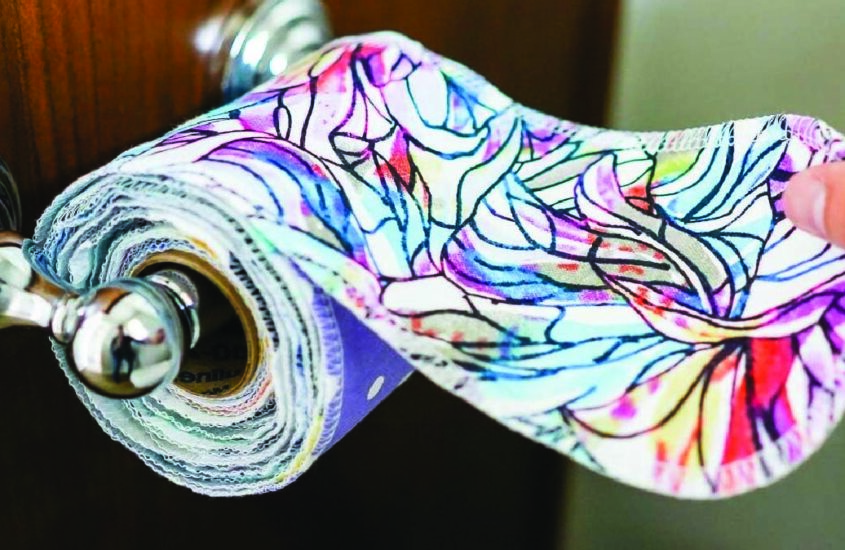
5 Reasons to Embrace Reusable Toilet Paper
In the realm of sustainable living, reusable toilet paper has emerged as a novel concept, challenging conventional norms and practices. Environmental concerns are at the forefront of the world’s attention, and as a result, there is a push towards finding more eco-friendly solutions. One potential solution that deserves further scrutiny is reusable toilet paper. This article delves into the intricacies of reusable toilet paper, exploring its environmental impact, cost-effectiveness, health considerations, practicality, and societal perspectives.
This post may contain affiliate links at no extra cost to you. Please read our full disclosure here to find out more.
In this article
Introduction
Definition of reusable toilet paper
Family cloth, also called reusable toilet paper or washable wipes, refers to cloth-based materials used instead of traditional toilet paper for personal hygiene after using the restroom. These materials are washable and reusable, aiming to reduce waste generation associated with disposable toilet paper.
Brief history of reusable toilet paper
Using toilet paper that can be washed and reused is somewhat novel. It has been practised since ancient times when people used different materials such as cloth, wool, and even natural sponges for personal hygiene. The rise in the use of reusable toilet paper can be attributed to the growing attention to environmental issues and the inclination towards sustainable living practices. The rise in popularity is due to individuals being conscious of their actions’ effect on the environment and their eagerness to create a beneficial difference.
Environmental Impact
Reduction of deforestation
One of the most significant benefits of reusable toilet paper is its potential to curb deforestation. Traditional toilet paper production relies heavily on virgin wood pulp, leading to forest depletion. By choosing to use reusable alternatives, people can make a considerable contribution to forest conservation efforts while simultaneously reducing their ecological footprint.
Decrease in water usage.
Contrary to popular belief, toilet paper production is a water-intensive process, requiring substantial amounts of water for pulp processing and manufacturing. Washable wipes minimizes water consumption by eliminating the need for continuous production cycles. Additionally, washing reusable cloths consumes less water compared to the manufacturing process of disposable toilet paper.
Mitigation of pollution
Disposing traditional toilet paper contributes to pollution, especially in water bodies, where untreated wastewater containing paper fibres and chemicals can harm aquatic ecosystems. Washable wipes mitigates this pollution by reducing the volume of waste generated and eliminating the need for chemical-laden toilet paper products.
Cost-effectiveness
Initial investment
While the initial cost of transitioning to reusable toilet paper may seem higher than purchasing conventional toilet paper, the long-term savings outweigh the initial investment. Investing in high-quality reusable cloths or wipes can significantly reduce recurring expenses associated with purchasing disposable toilet paper.
Long-term savings
In the long run, reusable toilet paper is more cost-effective as it eliminates the need for frequent purchases of disposable alternatives. By investing in durable and absorbent materials, individuals can save considerable money over time, making reusable options a financially prudent choice.

Health Considerations
Hygiene concerns
One common apprehension regarding reusable toilet paper is the perceived hygiene risks associated with its use. However, when properly maintained and laundered, reusable cloths pose no greater hygiene risk than disposable toilet paper. Regular washing with hot water and detergent effectively removes germs and bacteria, ensuring hygienic usage.
Allergy issues
Some people who have allergies or sensitive skin might be worried about the materials used in reusable toilet paper. Opting for hypoallergenic fabrics or organic cotton can alleviate these concerns, providing a gentle and irritation-free alternative for personal hygiene.
Practicality and Convenience
Washing and maintenance
The process of washing and maintaining reusable toilet paper is relatively straightforward. After use, soiled cloths can be stored in a designated container before being laundered with hot water and detergent. With proper hygiene practices and regular washing, reusable toilet paper can be as convenient as its disposable counterpart.
Availability and accessibility
While the availability of reusable toilet paper may vary depending on geographical location and retail outlets, the rise of online platforms and eco-conscious stores has made these products increasingly accessible. Additionally, DIY enthusiasts can easily create reusable toilet paper from repurposed fabrics or organic materials.
Social and Cultural Perspectives
Taboos and stigmas
The concept of reusable toilet paper may challenge societal taboos and cultural norms surrounding personal hygiene practices. However, with education and awareness campaigns highlighting the environmental benefits of reusable alternatives, perceptions are gradually shifting, and reusable toilet paper is gaining acceptance.
Promoting sustainability in daily habits
Making a deliberate choice to use reusable toilet paper demonstrates a commitment to sustainability and being environmentally conscious in daily habits. By taking action to reduce waste and minimize their impact on the environment, people can contribute to building a more sustainable future for generations to come. Embracing reusable toilet paper is one way to take such steps and contribute to a better tomorrow.
Eco-Friendly Reusable Toilet Paper Options on Amazon

When it comes to purchasing reusable toilet paper on Amazon, it’s essential to consider factors such as material, durability, and customer reviews. Here are three top-selling products that offer both quality and sustainability:
Marley’s Monsters Toilet UNpaper:
- Soft, super absorbent, and durable
- Tree-free alternative to traditional paper towels
- Each 24-pack roll can replace up to 72 rolls of paper towels annually
- Stylish and sustainable choice for reducing household waste
Betterway Bamboo Toilet Paper 3 Ply
- Softest Bamboo TP: Preferred by 96% in blind tests, Betterway offers unrivaled softness.
- 100 Day Risk-Free Guarantee: Enjoy hassle-free returns within 100 days if not completely satisfied.
- 57% More Square Feet Per Roll: With 360 sheets, Betterway provides exceptional value.
- 3-Ply Strength, 2X Absorption: Premium bamboo paper ensures durability and effective cleansing.
- Gentle On Sensitive Skin: Unscented and dye-free, perfect for those with sensitive skin
To make your purchase, simply click on the provided links to explore these top-rated products on Amazon. By choosing reusable toilet paper, you’re not only investing in a more sustainable future but also enjoying the comfort and convenience of a high-quality alternative to traditional toilet paper.
Conclusion
In conclusion, adopting reusable toilet paper presents a viable and eco-conscious solution to mitigate the environmental impact of conventional toilet paper usage. By considering the environmental benefits, cost-effectiveness, health implications, practicality, and societal perspectives, individuals can make informed choices that are aligned with their values and contribute to a greener world.















